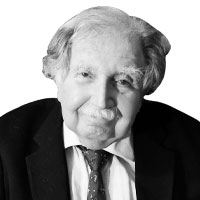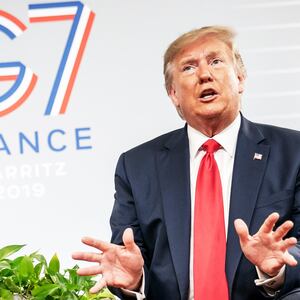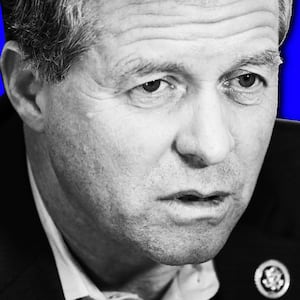It is now 75 years since the momentous summer of 1944 that saw the breakthrough in Normandy, the liberation of Paris, and the steady American advance across the Pacific. The architect of the alliance making this triumph possible was President Franklin Delano Roosevelt, whose goal was not only to prevail over the Axis but, as Nigel Hamilton writes in his history of FDR as war leader, “to form a worldwide international organization” to secure the peace.
That organization became the United Nations, which later this month will hold the 74th session of its General Assembly. Although Roosevelt did not live to see it, he considered the UN his crowning achievement, providing in Hamilton’s words, “ideals that men and women could fight for, not simply against.” For FDR, establishing an international authority that would guarantee the postwar peace was a pivotal war aim.
In Donald Trump we have a different man. Whereas Roosevelt sought to attract such ideological foes as the Soviet Union in the hope of sufficiently reconciling rivalries to achieve common goals, Trump seeks to inflame differences as he did at the recent G7 conference in Biarritz where he baited our allies on tariffs and global warming.
It was a performance that bodes ill for the upcoming UN meeting. In his previous performances before the UN Trump has scorned the ideal of globalization, boasted of American military might and mocked the North Korean leader as “rocket man.”
Sadly, Trump set about demolishing not only the postwar security arrangements forged by Roosevelt and his successors. He has launched an assault on FDR’s entire legacy. The forces of reaction that have sought to crumble the foundations of the New Deal for the last half century have finally found their sledge-hammer in the one-man wrecking crew of the current President.
As we observe Labor Day, we may lament the unraveling of the union protections guaranteed by the New Deal from the rights to organize, bargain, and strike, which has been a GOP project culminated by Trump with his slashing of the National Labor Relations Board budget and other anti-labor measures.
Donald Trump is the un-Roosevelt. FDR was a patrician who betrayed his class. Trump is a parvenu who enables that class. FDR sought to unite the nation on behalf of a noble cause. Trump seeks to divide it for his own self-interest. Roosevelt embraced the Four Freedoms: of speech and worship, and from want and fear. Trump abuses them, demonizing his critics as treasonous, denigrating Muslims as terrorists and Democratic Jews as disloyal, enriching the wealthy at the expense of working Americans and sowing fear and discord to maintain his hold on power.
Both men used the technology available to them. Roosevelt’s fireside radio chats reassured an anxious nation. Trump’s rants on Twitter incite his base. Roosevelt did not try to hide the bad news of the Depression or at the outset of the war, nor blame others for our setbacks. As he said after Pearl Harbor, “We will have to take a good many defeats before we have victory.” But, as he told Congress, “We will gain the inevitable triumph.”
In those dark days he asked Americans to aspire to the nation’s finest ideals and redouble their energies with fortitude. By contrast, Trump dismisses unwelcome information as “fake news,” doubles down when any of his falsehoods are challenged, and blames others for whatever goes wrong. For this President, the buck always stops elsewhere.
Since the end of World War II, the Republican Party stood for a foreign policy in which America assumed responsibilities for international commitments to our allies. While these arrangements could be interventionist, imperfect, and mistaken, by and large they maintained a global order of peace and prosperity. To be sure, the United States did significant harm in Guatemala, the Congo, Iran, and Vietnam, and elsewhere; but it also achieved considerable good in terms of Third World development, education and infrastructure, together with advancing the cause of democracy across the globe.
Under Donald Trump this is no longer the case. Rather, the GOP has reverted to the isolationism that marked it in the 1930’s, which proved to be a near-calamity for the nation. In doing so Trump and his enablers have reversed a half-century of bipartisan accord in maintaining American leadership of the free world. It is a devil’s bargain that threatens American security as well as global stability.
Trump’s signature shout-out of “America First” is a throwback to the America First Committee that rallied a considerable following in Congress, in the media, and on campuses to the banners of isolationism as Hitler’s armies swept through Poland, France, and the Lowlands, threatening England. They argued that Europe’s conflicts were not our concern. In short order, America First developed into a movement of appeasement laced with Nazi sympathies and anti-Semitism.
The climax of this frenzy came at a rally in Des Moines in September 1941, where Charles Lindbergh accused the “Jewish races” and others who were not, in his eyes, real Americans of prodding the nation toward conflict. Three months later, Pearl Harbor and Hitler’s subsequent blunder of declaring war on the United States put an end to the America First campaign. Now, after 80 years, Donald Trump has breathed life into a new strain, adopting the movement’s very name in his go-it-alone fervor.
In the face of conservative isolationism, Roosevelt built the alliance with Great Britain, the Soviet Union, and China that only together could defeat the Axis. After his death, the nature of America’s allies changed with the onset of the Cold War, but what remained the same was the understanding that America could not remain in splendid isolation.
The United States, as the strongest power to emerge from the devastation of World War II, would have bear the responsibility of maintaining global stability by forging a network of alliances, leading not through intimidation but by example. Trump has laid waste to this policy.
We may well ask ourselves how we have arrived at this pass – from Winston Churchill and Franklin Roosevelt to Boris Johnson and Donald Trump. It may well be that their apparent disparities in style actually indicate a profound difference of substance. Roosevelt was a great listener. Trump declaims. Roosevelt had the confidence to consider the opinions of others and then decide. Trump hears the last person in the room. Roosevelt had an overriding sense of purpose. Trump operates on whim. Roosevelt was not infallible but he learned from his mistakes. Trump does not admit to making any.
Roosevelt was vilified by a hostile press but was wise enough to give it leeway even when the Chicago Tribune leaked war plans in what was arguably an act of treason. Trump has declared the opposition media “an enemy of the people.” Roosevelt was willing to accept bad news. Trump calls it fake news. Roosevelt made sure that all of his measures leading up to war had the approval of Congress. Trump has bypassed Congress with a myriad of executive orders based on a self-induced crisis at the border
Roosevelt ran a bipartisan cabinet whose top officials—including Republicans, such as War Secretary Henry Stimson—could forcefully dissent. Trump conducts a court where sycophants pay him obeisance. Roosevelt won over many opponents with wit and the force of his well-reasoned arguments. Trump is ill-informed, impatient with dissent, and seeks to dominate by force of will. Roosevelt used flattery to disarm the skeptical. Despots use flattery to manipulate Trump.
Perhaps the greatest irony in all of this dissonance is that the nation Roosevelt forged that emerged whole from the crucibles of Depression and World War II is the very country that Trump evokes when he promises “to make America great again.” In fact, Donald Trump is weakening the very pillars that made America great.
As we celebrate Labor Day, he attacks the very foundations of the union movement. As we anticipate the meeting of the General Assembly, he seeks to dismember the very alliances that undergird it. The only American carnage that we need fear is the one inflicted by our current President on a nation of unity and a world of prosperity and peace envisioned by Franklin D. Roosevelt.
Jack Schwartz was formerly book editor of Newsday.








